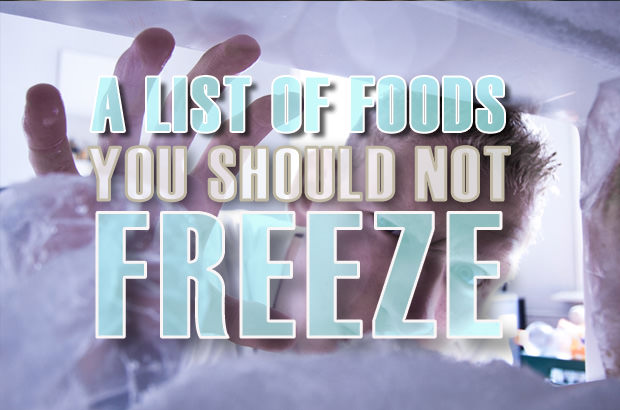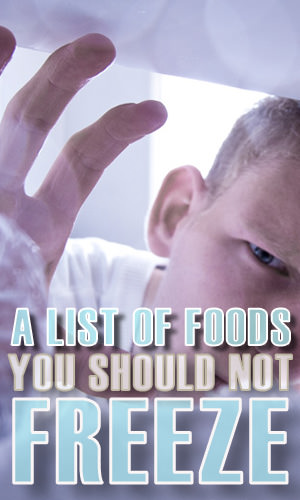
A List Of Foods You Should Not Freeze
Posted on 18 May, 2019
 Freezing is a great way to safely preserve the freshness of most foods. But some foods don't hold up after being defrosted. To save you the trouble of freezing food that you will later not be able to use, we’ve put together a list of foods that don’t freeze well.
Freezing is a great way to safely preserve the freshness of most foods. But some foods don't hold up after being defrosted. To save you the trouble of freezing food that you will later not be able to use, we’ve put together a list of foods that don’t freeze well.
Eggs In Their Shells

In the freezer, liquid inside an uncooked egg expands and cracks the shell and can potentially let in bacteria when thawing.
Hardboiled eggs that are frozen become rubbery after it’s thawed.
Sometimes, a recipe calls for us to just use the yolk of an egg. You can go ahead and store the white of the egg in a freezer bag for later use. They are great for merengues, bread glaze, frosting, mousse and macaroons. Be sure to label your bag though, because it can be hard to visually determine the number of egg whites you have stored away.
Egg yolks don’t freeze as nicely as egg whites as they tend to dry out.
Fresh Produce
 (Watermelon, apples, celery, leafy greens, potatoes, and cucumbers)
(Watermelon, apples, celery, leafy greens, potatoes, and cucumbers)
You may want to reconsider freezing raw produce that you intend to eat raw again. Instead of returning to their crispy, crunchy state, they'll turn limp and soggy. A defrosted tomato on top of a salad? Hmmm, no thank you.
However, if you plan on using your tomato to cook something else, say a sauce or a stew, then tomatoes will work.
Herbs on the whole retain their flavor but they’ll probably turn dark brown and gnarly. It’s fine if you’re not using them as garnishing, but as an ingredient.
Egg-Based Sauces And Creams
 (Mayonnaise, egg-white frosting, hollandaise, custards, whipped cream and meringues)
(Mayonnaise, egg-white frosting, hollandaise, custards, whipped cream and meringues)
Thick creams like mayonnaise, custard and hollandaise separate and become watery and lumpy. Frosting and cream made from egg whites lose their fluffiness and weep when they are thawed, turning them into a big watery mess. Cakes with butter-based frosting freezes well.
Battered And Fried Food
 Battered and fried food lose their signature crispy, crunchy, greasy goodness once they are frozen. You may be able to revive the crunch by frying it again, but you will be adding in extra fat.
Battered and fried food lose their signature crispy, crunchy, greasy goodness once they are frozen. You may be able to revive the crunch by frying it again, but you will be adding in extra fat.
The same applies to crumb toppings of casseroles, mac and cheese or pies. The whole point of a crumb topping is to bring crunch and new texture to a dish. Unfortunately, they become soft and soggy if you freeze and then defrost them.
Yogurt, Soft Cheeses And Sour Cream
 If you put cottage or ricotta cheese in the freezer, the moisture will crystallize and you will lose the cheese's light, fluffy texture. Freezing sour cream and yogurt will cause the curds to separate from the whey, and it thaws into watery grossness. You can stir it back together and use it in cooking, but you probably would not want to eat it on its own in its thawed state.
If you put cottage or ricotta cheese in the freezer, the moisture will crystallize and you will lose the cheese's light, fluffy texture. Freezing sour cream and yogurt will cause the curds to separate from the whey, and it thaws into watery grossness. You can stir it back together and use it in cooking, but you probably would not want to eat it on its own in its thawed state.
If you put a block of hard cheese in the freezer, it will turn crumbly and mealy. It’ll be acceptable for cooking, but otherwise not great to eat on its own.
Coffee
 Coffee shouldn’t be stored in the freezer—especially dark roasts. The oils that make them so special break down in freezing temperatures, allowing the coffee to readily absorb off-flavors.
Coffee shouldn’t be stored in the freezer—especially dark roasts. The oils that make them so special break down in freezing temperatures, allowing the coffee to readily absorb off-flavors.
Final Word
Freezing the foods above won't harm you if you decided to eat them. In an attempt to not take up limited freezer space, our suggestion is merely that you don’t freeze foods that you will not end up eating later.
Photo Credits
Book Recommendations For Healthy Eating

by Angela Liddon

by Dr. Alejandro Junger

by Dr. Alejandro Junger

by Jo Robinson

 10 Foods That Fight Fatigue
10 Foods That Fight Fatigue Children Who Do Not Take The School Bus
Children Who Do Not Take The School Bus A Guide To Buying The Right Running Shoes
A Guide To Buying The Right Running Shoes A Year Without Television
A Year Without Television










